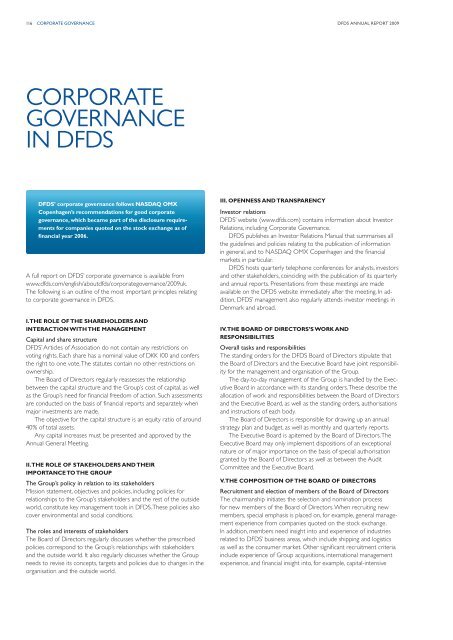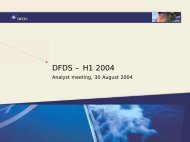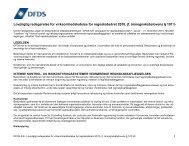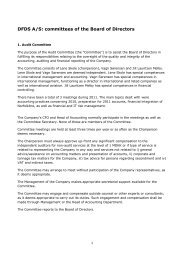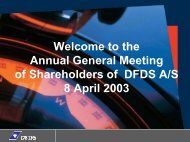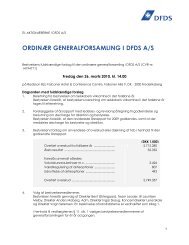English - DFDS
English - DFDS
English - DFDS
Create successful ePaper yourself
Turn your PDF publications into a flip-book with our unique Google optimized e-Paper software.
116<br />
Corporate Governance<br />
<strong>DFDS</strong> annual report 2009<br />
Corporate<br />
Governance<br />
iN <strong>DFDS</strong><br />
<strong>DFDS</strong>’ corporate governance follows NASDAQ OMX<br />
Copenhagen’s recommendations for good corporate<br />
governance, which became part of the disclosure requirements<br />
for companies quoted on the stock exchange as of<br />
financial year 2006.<br />
A full report on <strong>DFDS</strong>’ corporate governance is available from<br />
www.dfds.com/english/aboutdfds/corporategovernance/2009uk.<br />
The following is an outline of the most important principles relating<br />
to corporate governance in <strong>DFDS</strong>.<br />
I. The role of the shareholders and<br />
interaction with the management<br />
Capital and share structure<br />
<strong>DFDS</strong>’ Articles of Association do not contain any restrictions on<br />
voting rights. Each share has a nominal value of DKK 100 and confers<br />
the right to one vote. The statutes contain no other restrictions on<br />
ownership.<br />
The Board of Directors regularly reassesses the relationship<br />
between the capital structure and the Group’s cost of capital, as well<br />
as the Group’s need for financial freedom of action. Such assessments<br />
are conducted on the basis of financial reports and separately when<br />
major investments are made.<br />
The objective for the capital structure is an equity ratio of around<br />
40 % of total assets.<br />
Any capital increases must be presented and approved by the<br />
Annual General Meeting.<br />
II. The role of stakeholders and their<br />
importance to the Group<br />
The Group’s policy in relation to its stakeholders<br />
Mission statement, objectives and policies, including policies for<br />
relationships to the Group’s stakeholders and the rest of the outside<br />
world, constitute key management tools in <strong>DFDS</strong>. These policies also<br />
cover environmental and social conditions.<br />
The roles and interests of stakeholders<br />
The Board of Directors regularly discusses whether the prescribed<br />
policies correspond to the Group’s relationships with stakeholders<br />
and the outside world. It also regularly discusses whether the Group<br />
needs to revise its concepts, targets and policies due to changes in the<br />
organisation and the outside world.<br />
III. Openness and transparency<br />
Investor relations<br />
<strong>DFDS</strong>’ website (www.dfds.com) contains information about Investor<br />
Relations, including Corporate Governance.<br />
<strong>DFDS</strong> publishes an Investor Relations Manual that summarises all<br />
the guidelines and policies relating to the publication of information<br />
in general, and to NASDAQ OMX Copenhagen and the financial<br />
markets in particular.<br />
<strong>DFDS</strong> hosts quarterly telephone conferences for analysts, investors<br />
and other stakeholders, coinciding with the publication of its quarterly<br />
and annual reports. Presentations from these meetings are made<br />
available on the <strong>DFDS</strong> website immediately after the meeting. In addition,<br />
<strong>DFDS</strong>’ management also regularly attends investor meetings in<br />
Denmark and abroad.<br />
IV. The Board of Directors’s work and<br />
responsibilities<br />
Overall tasks and responsibilities<br />
The standing orders for the <strong>DFDS</strong> Board of Directors stipulate that<br />
the Board of Directors and the Executive Board have joint responsibility<br />
for the management and organisation of the Group.<br />
The day-to-day management of the Group is handled by the Executive<br />
Board in accordance with its standing orders. These describe the<br />
allocation of work and responsibilities between the Board of Directors<br />
and the Executive Board, as well as the standing orders, authorisations<br />
and instructions of each body.<br />
The Board of Directors is responsible for drawing up an annual<br />
strategy plan and budget, as well as monthly and quarterly reports.<br />
The Executive Board is apitemed by the Board of Directors. The<br />
Executive Board may only implement dispositions of an exceptional<br />
nature or of major importance on the basis of special authorisation<br />
granted by the Board of Directors as well as between the Audit<br />
Committee and the Executive Board.<br />
V. The composition of the Board of Directors<br />
Recruitment and election of members of the Board of Directors<br />
The chairmanship initiates the selection and nomination process<br />
for new members of the Board of Directors. When recruiting new<br />
members, special emphasis is placed on, for example, general management<br />
experience from companies quoted on the stock exchange.<br />
In addition, members need insight into and experience of industries<br />
related to <strong>DFDS</strong>’ business areas, which include shipping and logistics<br />
as well as the consumer market. Other significant recruitment criteria<br />
include experience of Group acquisitions, international management<br />
experience, and financial insight into, for example, capital-intensive


